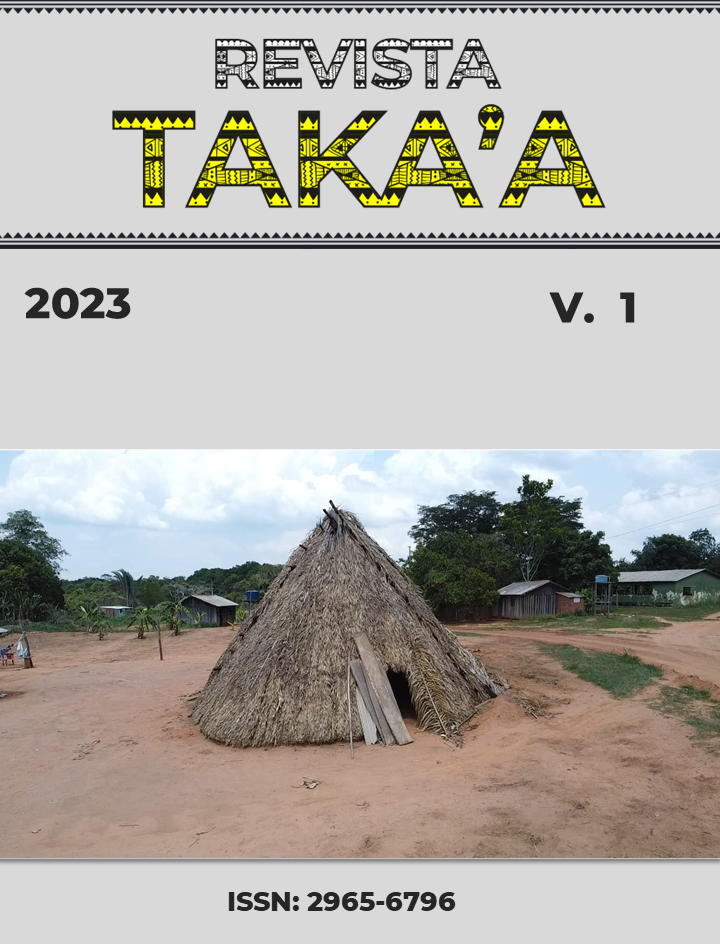Traditional plantation as a policy to strengthen the Apyãwa language
Keywords:
Traditional knowledge, Apyãwa school educationAbstract
In this article, we present a piece of research carried out during the period of one of the courses in the Postgraduate Program in “Teaching in an Intercultural Indigenous Context” - PPGECII/UNEMAT, whose theme is the traditional Apyãwa farm. We also wanted to contribute to strengthening and maintaining this knowledge in our villages, through the school, which plays a very important role in working with the written modality of knowledge. The choice to work on this topic was also due to the fact that our schools have very few specific authorial didactic productions about our traditional knowledge. The methodology of the work is composed, firstly, of research with the elders, in order to deepen the study of the subject. Then we moved on to pedagogical work at the school, which was mediated by me throughout the teaching and learning process focused on the traditional Apyãwa farm, working on written production. Another purpose of this work was to improve my pedagogical practice as a teacher, so that I can have the serenity to work on traditional Apyãwa knowledge with my students. We want to emphasize that the production of materials on this topic was very relevant for the schools in the Apyãwa villages. Our culture is alive and kicking, resisting the presence of Western culture. And even though our culture is strong, this Western presence is a very worrying issue in the community, since it interferes with the functioning of our Apyãwa culture.
Downloads
References
BRASIL. Referencial curricular nacional para as escolas indígenas. Ministério da Educação e do Desporto, Secretaria de Educação Fundamental. - Brasília: MEC/SEF, 1998.
BELTZ Leilacir. Roças Indígenas no Estado de Mato Grosso: Educação Ambiental e Sustentabilidade entre os Estudantes da Faculdade Indígena Intercultural – Cáceres. Mato Grosso, Brasil 2012.
FERREIRA, Waldinéia Antunes de Alcântara. Metodologia da Pesquisa Educacional: pedagogia intercultural. Cáceres: Layout Gráfica, 2020.
FRANCO, Maria Amélia do Rosario Santoro. Prática pedagógica e docência: um olhar a partir da epistemologia do conceito. R. Bras. Est. Pedag. [online]. 2016, vol.97, n.247, pp.534-551. ISSN 2176-6681. https://doi.org/10.1590/S2176-6681/288236353.
FREIRE, Paulo. Pedagogia do oprimido. 11. ed. Rio de Janeiro: Paz e Terra, 1982.
KUPODONEPÁ, Jairton. FERREIRA, Waldinéia. Antunes. de Alcântara. (2024). A roça tradicional: aspectos da ancestralidade e pedagogia Balatiponé-Umutina na etnomatemática. Revista Taka’a, 1, e392304. Disponível em https://periodicos.unemat.br/index.php/rtakaa/article/view/12452
RODRIGUES, Aryon Dall’Igna. Línguas Brasileiras: para o conhecimento das línguas indígenas. São Paulo: Edições Loyola, 1986.
TAPIRAPE, Koria Valdivane. A formação do corpo e da pessoa entre o Apyãwa– resguardos, alimentos para os espíritos e transição alimentar. UFG, GO. Dissertação do mestrado, 2019.
ZOIA, Alceu. TAPIRAPÉ, Taroko Edimundo. E. (2023). Desenho e escrita no mundo da criança Apyãwa: práticas pedagógicas interculturais. Revista Taka’a, 1, e2023001. Disponível em https://periodicos.unemat.br/index.php/rtakaa/article/view/11718
CONSULTOR NATIVO
TAPIRAPÉ, José Miguel Awaetekato’i. Saberes sobre a roça Apyãwa. Epistemologias Apyãwa, T.I Urubu Branco. Aldeia Tapi’itãwa, 2024.








